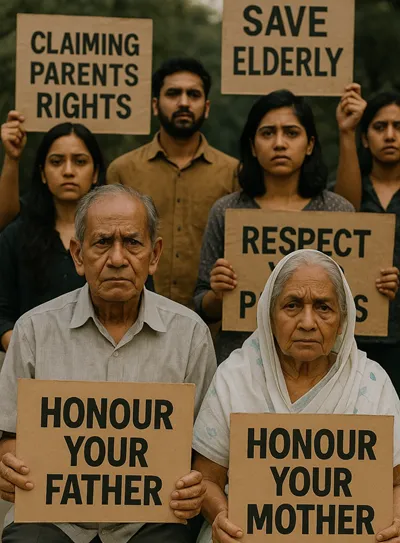
This Act was passed to ensure that elderly parents and senior citizens are taken care of by their children or relatives and do not suffer due to neglect or lack of resources.
Key Features:
- Legal Right to Maintenance: Parents (biological, adoptive, or step) and senior citizens (aged 60+) can demand monthly maintenance from their children or legal heirs.
- Maintenance Tribunal: A special tribunal is set up in each district to quickly resolve maintenance claims (within 90 days).
- Maximum Maintenance: The tribunal can order up to ₹10,000 per month as maintenance.
- Appeal Provision: If not satisfied, the parent/senior citizen can appeal the order to an appellate tribunal.
- Abandonment is a Crime: Abandoning parents or senior citizens is punishable with up to 3 months’ jail or a fine, or both.
- Right to Reclaim Property: If a senior citizen transfers property to a child or relative with the understanding of care/support, and the relative fails to provide it, the property can be taken back.
- Applicability: This law applies to all Indian citizens, regardless of religion.
- Purpose: To protect the dignity, financial security, and well-being of older people and ensure they are not neglected in their old age.
FAQs – Maintenance and Welfare of Parents and Senior Citizens Act, 2007
-
1. What is the purpose of this Act?
-
To ensure that parents and senior citizens are not neglected and can claim maintenance from their children or legal heirs.
-
2. Who can claim maintenance under this Act?
-
Biological, adoptive, or step-parents, and any citizen aged 60 years or above.
-
3. Who is responsible for paying maintenance?
-
Children (sons, daughters, grandchildren) or legal heirs of the senior citizen.
-
4. Is it applicable to both sons and daughters?
-
Yes. Both sons and daughters (including daughters-in-law and sons-in-law in some cases) are equally responsible.
-
5. What is the maximum maintenance amount?
-
Up to ₹10,000 per month, as decided by the Maintenance Tribunal.
-
6. Where can one file for maintenance?
-
In the Maintenance Tribunal established in every district.
-
7. Is there any fee for filing the application?
-
No. The process is simple and free of cost.
-
8. How much time does the Tribunal take to decide?
-
Generally, the Tribunal must dispose of the case within 90 days.
-
9. What if the child refuses to pay after the order?
-
The Tribunal can issue a warrant and order arrest or attach property.
-
10. Can parents reclaim gifted property if neglected?
-
Yes. If property was transferred under the condition of care, and that care is denied, they can reclaim it through the Tribunal.
-
11. Can parents living abroad file a case under this Act?
-
Yes, if they are Indian citizens and the child resides in India.
-
12. What if a parent doesn’t have proof of the child’s income?
-
That is not required. The Tribunal will assess based on available evidence and hearing both sides.
-
13. Is abandonment by parents punishable?
-
Yes. It is a criminal offence punishable with up to 3 months of imprisonment, a fine, or both.
-
14. Can maintenance be claimed only for physical needs?
-
No. It covers food, clothing, residence, medical attendance, and treatment.
-
15. Can senior citizens stay in care homes under this law?
-
Yes. The government may set up old-age homes in every district under this Act.
-
16. Can parents disown their children legally?
-
Yes, if children are abusive or neglectful. Public notices are sometimes used for this.
-
17. Can illiterate or poor parents use this law?
-
Yes. The law is meant to be accessible to all, and the Tribunal helps with the process.
-
18. Can someone challenge the Tribunal’s decision?
-
Yes. The order can be appealed before an Appellate Tribunal.
-
19. Is this law applicable only to Hindus?
-
No. It applies to all religions and communities in India.
-
20. Does it apply to NRIs (Non-Resident Indians)?
-
Yes. If the children are Indian citizens or legal heirs, they are liable under this Act.
Add new comment